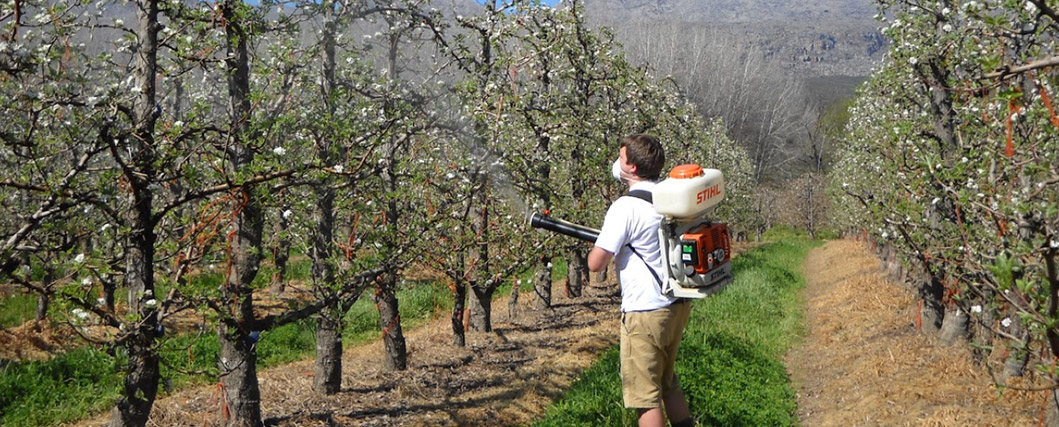
Ulwazi jikelele
Food is a fundamental human right, and yet millions of people around the world go hungry every day. Working towards food security – producing safe, disease-free and nutritious food for an ever growing population – is increasingly important
The Department of Plant Pathology is at the forefront of research to decrease the impact of pathogens (infectious diseases) on crops, and to increase crop resistance, thereby adding momentum to food production. The Department has a holistic and interdisciplinary approach to research and training, and makes use of the latest technologies in order to reduce the impact of pathogens on plants, and to increase resistance in plants. Conventional and molecular techniques are used to control plant pathogens, that are a threat to local crops and export markets. Students are trained in the detection, characterisation and epidemiology of plant pathogens, as well as in the use of integrated disease control strategies to control these pathogens.
Iseshini yolwazi
iiVidiyo
Iincwada
IMibuzo eVamise ukuBuzwa
- What are the admission requirements for the Plant and Soil Sciences programme?
- How many years are the BScAgric Plant and Soil Sciences programme?
- Which programme(s) do I follow to have Plant Pathology as a major subject?
- Must I have Physical Sciences or Biological Sciences for the Plant and Soil Sciences programme?
- Can I study BScAgric if I have Mathematical Literacy?
- Is there a postgraduate programme for BScAgric with Plant Pathology?
- Does Plant Pathology involve practicals and field work?
- What are my career opportunities with a degree in Plant Pathology?
- Is the field of Plant Pathology mainly in a laboratory or in the field?
- What kind of person will become a plant pathologist?
- Why is the work of a Plant Pathologist important?
- What does the field of Plant Pathology entails?
60% average for the NSC, 50% for English or Afrikaans, 60% for Mathematics and 50% for Physical Sciences. Please note that only a limited number of students can be accommodated and meeting the requirements, unfortunately, does not guarantee a place in the programme.
Four years
You apply for the BScAgric Plant and Soil Sciences programme. You can choose between two fields namely Crop Production and Crop Protection and Breeding. The fields have the same first-year modules (subjects). Only in your third and fourth year, do you choose Plant Pathology as your major subject.
You must have Physical Sciences.
No, unfortunately, you need pure Mathematics – with Mathematical Literacy you could consider applying for programmes offered at the Elsenburg Agricultural College which is situated 10km outside Stellenbosch (visit their web page here).
Yes, after your BScAgric degree with Plant Pathology as one of your majors, you can continue with an MSc in Plant Pathology, and thereafter with a PhD. Students from the Faculty of Science with a 3-year degree in either Botany, Genetics, Microbiology or Biotechnology, and a minimum average of 60% for their major, may continue with an honours degree in Plant Pathology.
Yes, each Plant Pathology module will consist of one practical per week which is mainly laboratory work. In your fourth year, you will do a project which may take you out in the field (depending on the type of project you select). You will also be going on field excursions for some of the practicals in your fourth year.
You can follow a career as a researcher, academic, consultant, technician, plant breeder, as well as a career in agricultural enterprises, agricultural chemical companies, or diagnostic clinics.
The nice thing about plant pathology is that it combines the observation of the micro-world and the macro-world. You can go out to the field and observe agricultural crops and then come back to the lab and peek under a microscope or do molecular analyses.
One who loves nature, especially plants; enjoys laboratory and fieldwork; has an eye for detail; is inquisitive; accurate; patient; persistent; interested in biology and agriculture, a problem solver; hard-working; has good communication and writing skills.
About 40% of all food that is produced, is lost due to plant diseases, pests, and weeds. We need to manage plant diseases to be able to feed a rapidly growing world population.
Plant Pathology is the study of micro-organisms (fungi, bacteria and viruses) and the environmental conditions that cause disease in plants, the mechanisms by which diseases occur, interactions between micro-organisms and the plant, and lastly methods of managing diseases. Do watch the presentation to learn more.






